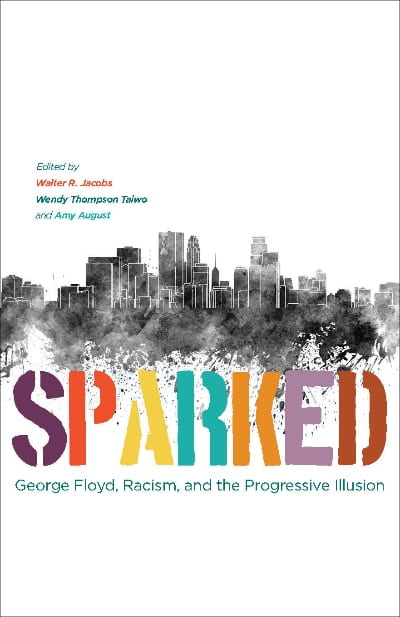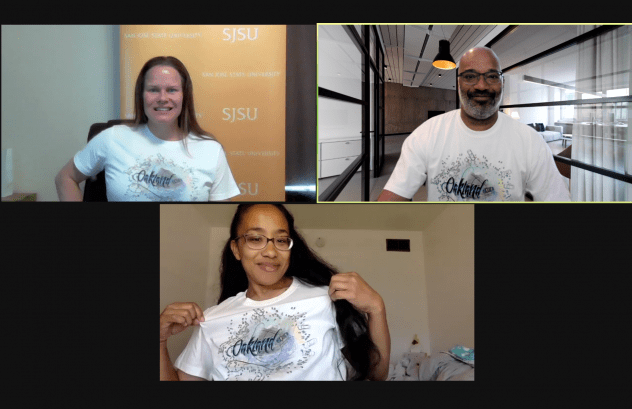
Walt Jacobs, dean of SJSU’s College of Social Sciences, co-edited this anthology with faculty members Wendy Thompson Taiwo and Amy August. Photo courtesy of Walt Jacobs.
On May 25, 2020, Minnesota resident George Floyd was murdered at the hands of police officer Derek Chauvin – a tragedy captured on a cell phone video by a bystander on a nearby sidewalk.
Four days later, San José State College of Social Sciences Dean and Sociology Professor Walt Jacobs emailed his faculty and staff to acknowledge their collective grief and offer a few ideas about how they could respond by contributing to the national dialogue about race in America.
“As human beings, many of us are overwhelmed by the complexity of the situation and the intense emotions it has created,” Jacobs wrote on May 29. “As members of an institution that strives for social justice, we feel discouraged and outraged. And, as social scientists, we are wondering how our disciplines and our knowledge can contribute to solutions.”
That email, coupled with a conversation Jacobs later had with SJSU African American Studies Assistant Professor Wendy Thompson Taiwo, blossomed into a series of essays for The Society Pages. Inspired by the responses he was getting from colleagues with ties to Minnesota, Jacobs recruited Taiwo and Assistant Professor of Sociology Amy August to curate and edit an anthology of 36 essays titled “Sparked: George Floyd, Racism, and the Progressive Illusion” (published by Minnesota Historical Society Press).
A “wonderful and wretched” place for people of color

Three SJSU faculty collaborated to edit “Sparked”: Amy August (top left), Walt Jacobs (top right) and Wendy Thompson Taiwo (center). Photo courtesy of Walt Jacobs.
A self-identified Minnesotan, Jacobs served as a professor of African American Studies at the University of Minnesota for 14 years, five of which he was department chair. Floyd’s murder just a mile from Jacobs’ former home sparked his desire to contextualize the intersectionality of race, culture and academia so often defined as “Minnesota nice.”
As he wrote in a 2016 “Blackasotan” essay, Jacobs asserts that “[life in] the land of 10,000 lakes helped [him] see that there were 10,000 ways to be Black.”
Thompson Taiwo’s experiences as a Black academic and mother in Minnesota prove Jacobs’ thesis. During her four years as assistant professor of ethnic studies at Metropolitan State University in St. Paul, Thompson Taiwo said she “experienced unmistakably racist personal incidents and saw the way that anti-Blackness operated on a structural level.
“Walt had a more positive relationship to Minnesota; not that he never experienced racism, but for me, it was stark. Thus, the juxtaposition that got this whole project started: Minnesota, for Black people, is both wonderful (Walt) and wretched (me).”
The anthology, published close to the anniversary of Floyd’s death and not long after Chauvin’s guilty verdict, brings together the perspectives of social scientists, professors and academics who work or have worked in Minnesota.
The essays present reflections on racial dynamics in the Twin Cities and the intersection of “wonderful and wretched” sides of that existence, revealing deep complexities, ingrained inequalities and diverse personal experiences. Writers probe how social scientists can offer the data and education required to contribute to change.
“Data is really important — but how we contextualize the data and the narratives we create about that data is equally powerful,” said Thompson Taiwo.
“To bring it directly to SJSU, how can we look at current efforts on campus — defunding and removing the police, enhancing the profile of the African American Studies Department, which provides a lens for understanding anti-Blackness and the long history and continuation of police murders of Black people, putting resources toward hiring more Black faculty and recruiting Black students — and lend our energies and solidarity to pushing those forward?
“Through collective grief and rage comes transformation. There is no reason why that transformation cannot continue on our campus and within our surrounding communities.”
August’s preface, “Coloring in the Progressive Illusion: An Introduction to Racial Dynamics in Minnesota,” provides some benchmark demographics and data detailing racial disparities in home ownership, health care, generational wealth and criminal justice.
As assistant director of the Institute for the Study of Sport, Society, and Social Change, she collaborates with a team of colleagues and student interns to promote social justice in and through sports. Like Jacobs and Thompson Taiwo, she studied and taught in Minnesota for several years.
“Helping to edit this book was a way to better understand how academics of color, including many of my friends and colleagues, were making sense of the racism and racial dynamics in an allegedly ‘progressive’ Minnesota,” said August.
“Because it was within the broader racial context that George Floyd was brutally murdered, within which the Black Lives Matter movement experienced yet another reawakening, and within which Minnesotans are even now reacting to the conviction of former officer Derek Chauvin, I see these essays as must-reads for all those interested in eradicating anti-Blackness and transforming race relations in Minneapolis and beyond,” she added.
Into the future
Jacobs, Thompson Taiwo and August conclude the anthology with an essay entitled “Where Will We Be on May 25, 2022?” They reflect on their initial reactions to Floyd’s murder and their hopes for the future.
Thompson Taiwo writes:
“What if we can, in the wake of George Floyd’s stolen life, have it all, everything our foremothers and othermothers and heroes and ancestors pocketed away and scrimped and hungered and struggled for? To find freedom this way requires one to dig deep into the speculative Black feminist tradition of imagining otherwise and otherworlds, knowing full well that we as Black people continue to live in the long afterlife of slavery, in the forever time of social death, and in a country that is consciously trapped in its own violent white settler colonial origin story.”
The College of Social Sciences’ Institute for Metropolitan Studies hosted a book launch event on May 18, 2021 at which Jacobs, Thompson Taiwo and contributor Marcia Williams, adjunct assistant professor of social and cultural sciences at Marquette University, were interviewed by Gordon Douglas, SJSU assistant professor of Urban and Regional Planning. The college will be hosting additional online book events in fall 2021.
Learn more about “Sparked” here.
